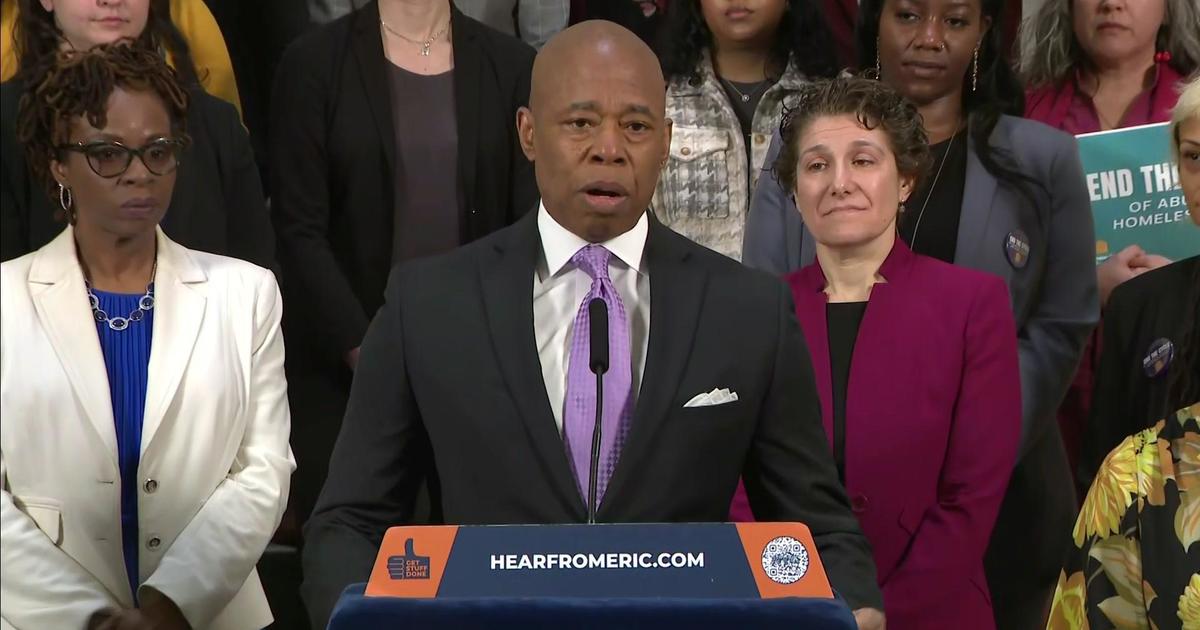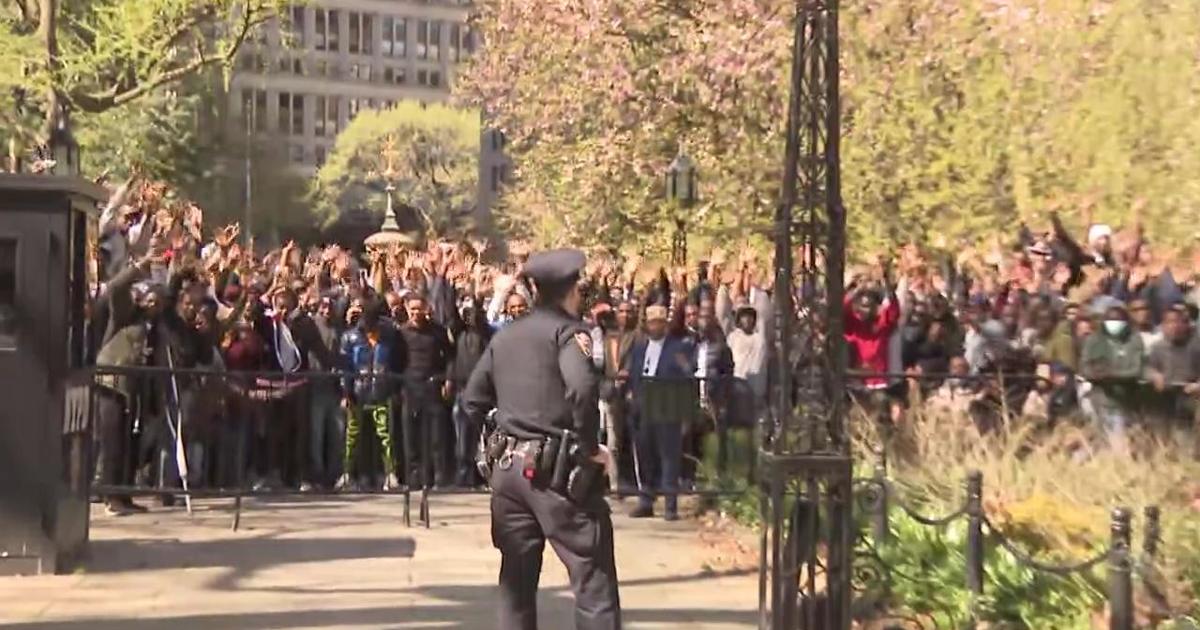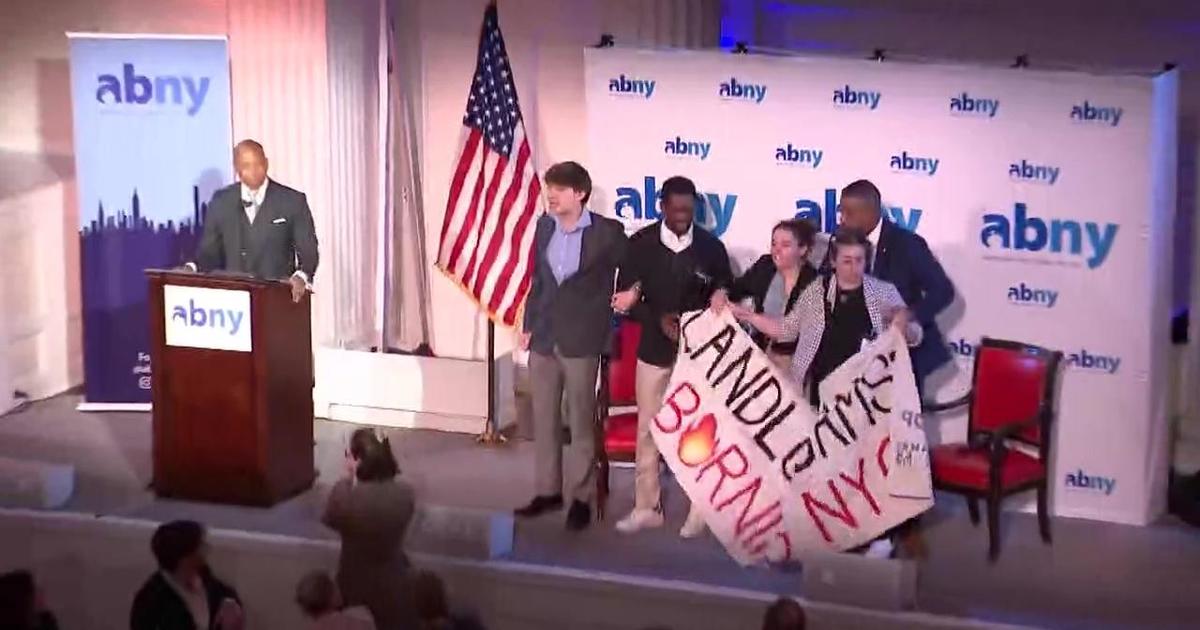De Blasio Takes Questions On Housing Issues In First Town Hall Of Term
NEW YORK (CBSNewYork) -- New York City Mayor Bill de Blasio held first full-fledged town hall since taking office Wednesday evening.
He met with residents in Washington Heights, largely to discuss rent security and other tenant issues. Most of the questions the mayor fielded allowed him to tout his affordable-housing plan.
``The people demand affordable housing. It is now required in this city, and that is going to change things for the long run,'' de Blasio said. ``You have the full weight of City Hall behind you.''
Addressing the crowd, de Blasio emphasized that the cost of housing has been going up astronomically for years in ways that no one could have predicted, while wages and benefits have not improved.
But he said Washington Heights and Inwood in Upper Manhattan have been focal points for maintaining and preserving affordable housing, as well as upgrading public housing developments.
The mayor went on to discuss his affordable housing plan, and answered an assortment of questions about housing issues.
"What we're trying to do is fix what's broken," Mayor de Blasio said.
De Blasio said his administration is seeking to "restore a sense in this community that working people can actually survive in New York City" – a sense that he said has been called into doubt for several years.
About 250 people attended the town hall, held in the gymnasium at Gregorio Luperon High School for Science and Mathematics on West 165th Street, and greeted de Blasio with a standing ovation. The participants were invited by about 20 civic groups, and many of them spoke only Spanish and relied on interpreters provided by de Blasio's administration.
Several people talked about the threat of eviction and the difficulty of raising families on low incomes, as well as questions about transferring leases.
And one woman, Martha Beato, said after a fire in her apartment, and was told she should go back to her country when she went to the Human Resources Administration, WCBS 880's Alex Silverman reported.
She said she was told, "You Latino people come here to this country to ask for help when you're supposed to go back to your country."
De Blasio called the comment unacceptable, and said anti-immigrant bias among city government workers would not be tolerated.
"Anybody who is a New Yorker and speaks against immigrants obviously doesn't know their own family history," the mayor said.
Another attendee suggested de Blasio's affordable-housing plan, which allows some market rate housing, would flood her neighborhood with wealthier new arrivals and push out longtime residents.
De Blasio defended his plan as the best solution to help low-income New Yorkers.
De Blasio, who took office in January 2014, has made affordable housing the central focus of his administration's year and has outlined the ambitious goal of creating or preserving 200,000 units of affordable housing within the decade. He has repeatedly pointed to skyrocketing housing costs as the biggest drain on New Yorkers' finances and has vowed to make housing more affordable as part of his fight against income inequality.
Despite his inexperience in the town hall setting, he seemed comfortable. His sleeves rolled up, he nodded intently as the attendees asked their questions, frequently touted a newly passed rent freeze for rent-stabilized apartments and often called on his army of commissioners to go into detail with their answers.
The mayor also discussed education policy, and pointed to Washington Heights and Inwood as a success story. He said 394 children attended full day pre-kindergarten when he took office, but the number skyrocketed to 1,388 last year, and 1,628 this year.
Not everyone was a fan of de Blasio's effort. The head of the Rent Stabilization Association, which represents 25,000 landlords of the city's 1 million rent-stabilized apartments in the five boroughs, called the meeting a "campaign rally" with a "sham audience."
"Mayor de Blasio is using a public school building for a re-election rally disguised as a town hall meeting, and he's running $1 million in taxpayer-funded campaign ads disguised as a public service message -- all to advance his re-election bid," Rent Stabilization Association President Joseph Strasburg said in a news release. "The mayor and sponsors handpicked the attendees. It's a sham audience packed with supporters only, and anyone else who shows up will be placed in another room outside of the main venue and not be allowed to ask questions. Why are the political watchdog organizations silent?"
Former Mayor Rudolph Giuliani held one monthly. His successor, Michael Bloomberg, would hold a few a year. Ed Koch, who was mayor from 1978 through 1989, thrived in the free-wheeling setting and held more than 15 annually.
De Blasio's critics said his avoidance of the format indicated he was out of touch with the day-to-day problems of everyday New Yorkers. City Hall rebutted that argument, saying the mayor would interact with voters while riding on the subway or while at the gyn.
But the team has recently increased the number of public interactions with constituents, trying to take advantage of the mayor's strong retail political skills. And the town hall also comes at a time when de Blasio's staff has changed strategy in dealing with the press, with whom the mayor has had a topsy-turvy relationship.
City Hall aides have cut back on his press conferences, fearing he can, at times, come off as long-winded and stiff behind the podium. Aides also have in recent weeks significantly limited the number of occasions for the City Hall press corps to ask the mayor questions.
Instead, they are opting for more one-on-one interviews, particularly on radio, settings in which de Blasio feels more comfortable. The mayor also has recently begun taking questions from callers during those radio appearances and recently did a Twitter chat, adding a venue in which to communicate directly with constituents.
(TM and © Copyright 2015 CBS Radio Inc. and its relevant subsidiaries. CBS RADIO and EYE Logo TM and Copyright 2015 CBS Broadcasting Inc. Used under license. All Rights Reserved. This material may not be published, broadcast, rewritten, or redistributed. The Associated Press contributed to this report.)



